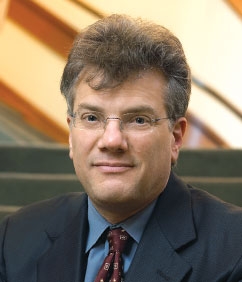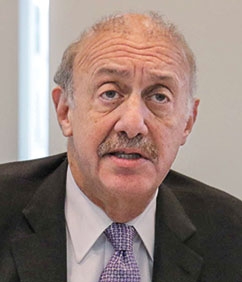NYU Law Forum assesses how the US election system is functioning
On October 20, with Americans already casting their ballots, an NYU Law Forum sponsored by Latham & Watkins assessed the challenges—legal and logistical—facing the US election system in the tumultuous 2020 election.
The COVID-19 pandemic, deep polarization among American voters, and President Donald Trump’s allegations of voter fraud have made this presidential race unique, noted panelist Benjamin Ginsburg, a retired Jones Day partner who has represented the Republican National Committee and the Bush-Cheney presidential campaign.
“If we do have an extremely close election that turns on the outcome in three or four states, I do think the situation is as explosive as any in my lifetime for an election,” said Richard Pildes, Sudler Family Professor of Constitutional Law and a CNN election analyst.
The panel, which also included Professor Franita Tolson of USC Gould School of Law, was moderated by Samuel Issacharoff, Bonnie and Richard Reiss Professor of Constitutional Law. Among the issues panelists discussed were current legal battles over election procedures, key districts to watch on Election Night, the probability of a contested election, and whether the courts will play a role in the determining the winner. Lastly, they considered potential changes to election administration: the US election system is in dire need of reform, all participants agreed.
Follow the full discussion on video:
Selected quotes from the discussion:
Franita Tolson: “Our election infrastructure was already fragile, right? So we’ve had two elections and five election cycles in which the winner of the electoral college lost the popular vote. And that really caused a lot of people to question the basic structure of our system, but that, combined with high levels of political polarization, crumbling election infrastructure.… state election processes [being] underfunded…as well as an increase in efforts to suppress the vote—it kind of makes you wonder if the chickens are just coming home to roost at this point.” (video 09:29)
Richard Pildes: “Let me talk about some of the big picture positives about how the system has changed for the election this fall.… Forty-five states are now permitting any voter who wants to vote by mail to vote by mail. And that was really the biggest policy issue early on when we started facing the virus and the election coming together.… The second thing that’s also changed in terms of adapting—and many of these changes have been put in place just for this election, not necessarily permanently—states that traditionally do not permit any early voting have shifted to permit early voting.… So, we have actually dramatically expanded the opportunities for participation and the ways people can participate, given the ongoing concerns with the virus.” (video 11:22)
Benjamin Ginsburg: “There’s one safeguard against massive hacking from foreign interference: it’s been our election systems are so old, and not connected to the internet in any systemic way, that they’d be really, really tough to hack. But that’s kind of small consolation.” (video: 1:19:46)
Pildes: “The biggest barrier to participation is the one that’s least focused on…which is the voter registration process, because we put the burden on voters in most states to register themselves to vote. In a lot of countries, the state automatically registers people to vote when they reach voting age.” (video 1:23:33)
Tolson: “We often focus on areas that are contested, areas that are in swing states.… If [election procedures] are going well in those areas, we assume that that applies more broadly than it actually does. It turns out that there are a lot of areas that are not contested, but part of the reason that they’re not contested is because voter suppression has been effective.” (video 1:26:15)
Posted October 28, 2020



